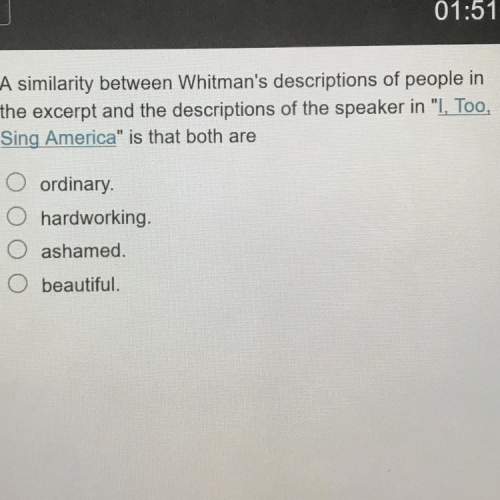Nd answer the following
in 1873 it was against the law for women to vote in the
state of...

English, 16.12.2019 21:31 garzar7523
Nd answer the following
in 1873 it was against the law for women to vote in the
state of new york as well as in other states. susan b.
anthony's speech says that voting is a right that is
"beyond the power of the state to deny." what does
this mean?
nthony's address
a.
it is morally wrong for states to deny citizens the
right to vote.
b.
citizen of the united states
to vote?
an b. anthony was arrested for
e presidential election. she
fined $100. in 1920, the 19th
u. s. constitution was ratified,
right to vote
the states possess the supreme power to decide
which citizens can and cannot vote.
the states do not have the power to deny the
c. right to vote because the power lies in the hands
of the federal government
d.
politicians with power have the ultimate say when
deciding which citizens can vote.
nment has no just powers
consent of the governed. to
ment is not a democracy. it is
is an odious aristocracy, a
of sex, the most hateful
stablished on the face of the

Answers: 3


Another question on English

English, 22.06.2019 02:00
Which pair of words has similar denotation but different connotations?
Answers: 2

English, 22.06.2019 02:30
Proofread this excerpt from a review of the film tangled. what type of errors does it contain? walt disney studios is back with another delightful film sure to entertain children and adults alike, hat’s off to the writer and director of this charming little endeavor. they have effectively managed to breathe new life into an old classic: by giving rapunzel's tale a fresh twist, instead of the meek and rapunzel of the original disney story; this retelling gives us a spunky and assertive heroine ready to take command of her own life. a. mixed-up tenses b. incorrect verb usage c. spelling errors d. punctuation errors
Answers: 1

English, 22.06.2019 05:00
Which phrase refers to the contrast between what is expected to happen and what actually does happen? situational ironydramatic ironyverbal ironyconflict and resolution
Answers: 2

English, 22.06.2019 05:20
Plz which of the following is true about third-person limited point of view? it uses the word i, and one character tells the story. it uses the word you and makes the reader feel a part of the story. the narrator is not part of the story and only states the characters' actions and speech. the narrator is not part of the story but knows what one character is thinking and feeling.
Answers: 1
You know the right answer?
Questions

History, 21.10.2021 14:00


Mathematics, 21.10.2021 14:00

Biology, 21.10.2021 14:00

Mathematics, 21.10.2021 14:00





English, 21.10.2021 14:00

Mathematics, 21.10.2021 14:00

History, 21.10.2021 14:00

Mathematics, 21.10.2021 14:00



Mathematics, 21.10.2021 14:00

Chemistry, 21.10.2021 14:00

Geography, 21.10.2021 14:00

Mathematics, 21.10.2021 14:00

Mathematics, 21.10.2021 14:00




